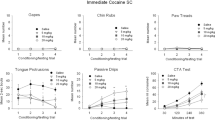Abstract
Various attempts have been made to account for the fact that pertreatment with some pharmacological agents reduces the ability of such agents to induce conditioned aversion to a flavor. One explanation, based on the concept of tolerance, suggests that pretreatment is effective because it renders the animal less sensitive to direct effects of a given dose of the agent. A second explanation emphasizes the possibility that procedural consequences of pretreatment interfere with associability of flavor and drug effect during conditioning. The second explanation was tested in two experiments. In Experiment I nonreinforced presentations of drug administration cues completely reversed the attenuating effects of amphetamine pretreatment on gustatory conditioning by amphetamine. This finding was replicated and extended in the second experiment which was also designed to eliminate an alternative nonassociative explanation for the results. The principle of associative blocking may explain the effect of pretreatment on subsequent gustatory conditioning by drugs.
Similar content being viewed by others
References
Braveman, N. S.: Formation of taste aversion in rats following prior exposure to sickness. Learn. Mot. 6, 512–534 (1975)
Braveman, N. S.: The role of blocking and compensatory conditioning in the treatment preexposure effect. Psychopharmacology, in press (1979)
Cappell, H., Le Blane, A. E.: Conditioned aversion by amphetamine: Rates of acquisition and loss of the attenuating effects of prior exposure. Psychopharmacologia (Berl.) 43, 157–162 (1975)
Cappell, H., Le Blanc, A. E.: Gustatory avoidance conditioning by drugs of abuse: Relationships to general issues in research on drug dependence. In: Food aversion learning, N. W. Milgram, L. Krames, T. M. Alloway, eds., pp. 133–167. New York, London: Plenum 1977a
Cappell, H., Le Blanc, A. E.: Parametric investigations of the effects of prior exposure to amphetamine on conditioned gustatory aversion. Psychopharmacology 51, 265–271 (1977b)
Cappell, H., Poulos, C. X.: Associative factors in drug pretreatment effects on gustatory conditioning: Cross-drug effects. Psychopharmacology 64, 209–213 (1979)
Cappell, H., Le Blanc, A. E., Herling, S.: Modification of the punishing effects of psychoactive drugs in rats by previous drug experience. J. Comp. Psychol. 89, 347–356 (1975)
Goudie, A. J., Taylor, M., Atherton, H.: Effects of prior drug experience on the establishment of taste aversions in rats. Pharmacol. Biochem. Behav. 3, 947–952 (1975)
Kamin, L. J.: Predictability, surprise, attention, and conditioning. In: Punishment, B. A. Campbell, R. M., Church, eds., pp. 279–296. New York: Appleton-Century-Crofts 1969
Le Blanc, A. E., Cappell, H.: Attenuation of punishing effects of morphine and amphetamine by chronic prior treatment. J. Comp. Psychol. 87, 691–698 (1974)
Le Blanc, A. E., Cappell, H.: Tolerance as adaption: Interactions with behavior and parallels to other adaptive processes. In: Alcohol and opiates: Neurochemical and behavioral mechanisms, K. Blum, ed., pp. 65–78, New York: Academic 1977
Le Blanc, A. E., Poulos, C. X., Cappell, H.: Tolerance as a behavioral phenomenon: Evidence from two experimental paradigms. In: Behavioral tolerance: Research and treatment implications, N. Krasnegor, ed., pp. 72–89. Rockville, Maryland: Natl. Inst. Drug Abuse Res. Monogr. Ser. 18, 1978
Mikulka, P. J., Leard, B., Klein, B.: Illness-alone exposure as a source of interference with the acquisition and retention of a taste aversion. J. Exp. Psychol. (Anim. Behav.) 3, 189–201 (1977)
Rescorla, R. A., Wagner, A. R.: A theory of Pavlovian conditioning: Variations in the effectiveness of reinforcement and nonreinforcement. In: Classical conditioning II, A. Black, W. F. Prokasy, eds., pp. 64–99. New York: Appleton-Century-Crofts 1972
Riley, A. L., Jacobs, W. J., LoLordo, V. M.: Drug exposure and the acquisition and retention of a conditioned taste aversion. J. Comp. Physiol. Psychol. 90, 799–807 (1976)
Rudy, J. W., Iwens, J., Best, P. J.: Pairing novel exteroceptive cues and illness reduces illness-induced aversions. J. Exp. Psychol. (Anim. Behav.) 3, 14–25 (1977)
Siegel, S.: Evidence from rats that morphine tolerance is a learned response. J. Comp. Physiol. Psychol. 89, 498–506 (1975)
Siegel, S.: Morphine tolerance acquisition as an associative process. J. Exp. Psychol. (Anim. Behav.) 3, 1–13 (1977)
Vogel, J. E., Nathan, B. A.: Reduction of learned taste aversions by pre-exposure to drugs. Psychopharmacology 49, 167–172 (1976)
Wagner, A. R.: Incidental stimuli and discrimination learning. In: Discrimination learning, R. M. Gilbert, N. S. Sutherland, eds., pp. 83–111. London: Academic 1968
Author information
Authors and Affiliations
Rights and permissions
About this article
Cite this article
Poulos, C.X., Cappell, H. An associative analysis of pretreatment effects in gustatory conditioning by amphetamine. Psychopharmacology 64, 201–207 (1979). https://doi.org/10.1007/BF00496063
Received:
Accepted:
Issue Date:
DOI: https://doi.org/10.1007/BF00496063




